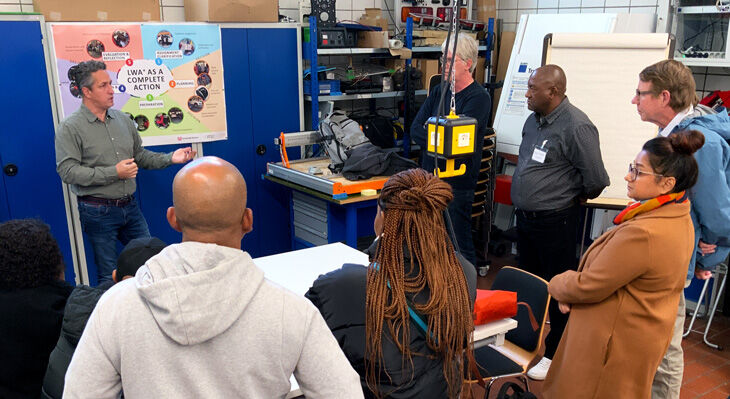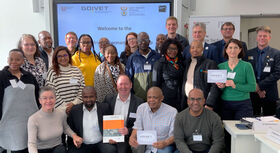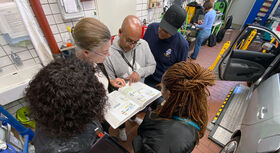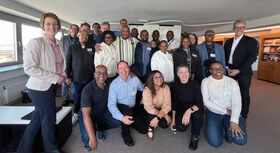South African Study Visit to Northern Germany: Spotlight on innovation in TVET teaching and learning
What are the quality requirements for VET staff? What support would they need to fulfil them? And which stakeholders should have a say when it comes to the revision of teaching and learning practices? A South African delegation visited Bremen and Hamburg on these topics in a GOVET study tour.

„When we embark on this transformation, no one is left behind“, emphasises Thivhudziwi Vele, Director for TVET Curriculum Development and Support at the Department of Higher Education and Training (DHET), and head of a South African delegation that explored VET teacher education and work-based curricular development on a Study Visit to Northern Germany. Thivhudziwi Vele’s words speak of the commitment to strengthening Vocational Education and Training as a top policy priority in addressing the more than 60% youth unemployment rate the country struggles with. Germany supports this agenda by concerted measures, including the bilateral cooperation of the Federal Ministry for Research and Education (BMBF) with DHET and their focus on lecturer and curricular development. A bilateral Expert Group on these topics is coordinated by GOVET.

The study visit in April 2025 highlighted the quality of teacher education, its pedagogical and didactic objectives, methodologies of teaching and learning, and the importance of practice integration in VET teacher education. An important aspect of the Study Visit was including a broad basis of stakeholders, which allowed to reflect different perspectives, interests and synergies deriving from a collaborative approach. Thus, representatives of university teacher education institutions, the college system, the qualification council in charge of training curricula, sector training authorities designed to secure interfaces between colleges and the business world, and VET research units formed part of the South African delegation.
Innovation in teaching and learning
The two Hanseatic cities of Bremen and Hamburg presented themselves as excellent places for the envisaged study objectives. Prof. Michael Gessler, Head of Division at Institute of Technology and Education (ITB), University of Bremen, and Prof. Waldemar Bauer (University of Erfurt), both members of the bilateral Expert Group, hosted a workshop on teacher education methodologies, and pathways into VET teachers’ careers. The South African partners responded with inputs on their current state of affairs in revising and introducing new curricula in teacher training, such as the Advanced Diploma and the Postgraduate Diploma. This led to lively discussions on the profile and standards of VET teachers in South Africa.

As for teaching objectives and methodologies, the group experienced the consistent practice integration themselves, in trying out learning and work assignments at an ITB car garage, and in the site visits at the Mercedes-Benz plant in Bremen, in the vocational school Technisches Bildungszentrum Mitte (TBZ), and at training facilities of the Skilled Crafts Chamber Bremen. ITB also shared expertise in integrating Artificial Intelligence in teacher training, developed in the EU funded project AI Pioneers to which BIBB contributes as well.
The Hamburg part of the visit added valuable insights into roles and the collaboration of stakeholders in VET. The city state developed a unique model of governance by establishing the Hamburg Institute for Vocational Education (HIBB) as a “state-owned management agency” to monitor and support their 30 VET schools.

The South African delegation was welcomed by HIBB CEO Dr. Sandra Garbade, and her deputy OIaf Albrecht. Two of the VET schools under the auspices of HIBB, based on the Wilhelmsburg campus, opened their doors to the group. ITECH (VET school 14), German school award winner in 2023, impressed by their strategic institutional reforms towards consistently new teaching and learning arrangements between staff and learners. Their key principles – working along learning fields, in project scenarios, with multi-disciplinary teams and farthest learner autonomy – materialise in the daily practice of the school.
Next door, in the School for Plant and Construction Technology (VET School 13), the group learnt about the programmatic changes towards sustainable solutions in the referring training offers, and in classroom and workshop encounters with teachers and trainees. Major take-away from both schools: There is no learning venue split-up into theory, represented by the school, on the one hand, and practice, i.e. company, on the other hand. The schools themselves have to integrate practical training into their every-day routine – and they do so.
The tour concluded with a visit to the recently established Vocational University Hamburg (Berufliche Hochschule) which represents a new model of learning venue cooperation. Here, both university and VET schools collaborate with local businesses in a triadic arrangement to offer vocational and academic degrees. This innovative approach sparked discussions within the multi-stakeholder South African group on the roles and competencies of institutions in the VET training value chain. And while there is never a copy-paste option in these encounters, the visit inspired reflections on genuinely South African ways of appropriation.
Way forward
The South African partners marked the learning outcome of the study visit as exceptional, emphasising the consistency of collaborative learning venue settings, the trust in apprentices and learners, the orientation of learning towards comprehensive action competence, and the hands-on methodology of practice in getting there.
Is this now to go on in a steady mode of productive discourse and development? Given that many of the participating partners wish to contribute to this future cooperation and DHET branded them as the bilateral “Forum”, there is good chance for it. First tangible task will be the elaboration of a “VET teacher profile” in the next phase of the cooperation.
Cooperation Background
BMBF and DHET have been fostering TVET cooperation for more than one decade. The main foci of the bilateral cooperation are on strengthening teaching staff and on developing work-based training standards. A particular emphasis is being placed on competencies for the digital and sustainable transformation of work and society. The bilateral Expert Group for Lecturer and Curricular Development, established in 2020 and coordinated by GOVET, is a centrepiece of the cooperation, and open to include more partners in a widening network of experts on topics of mutual interest.